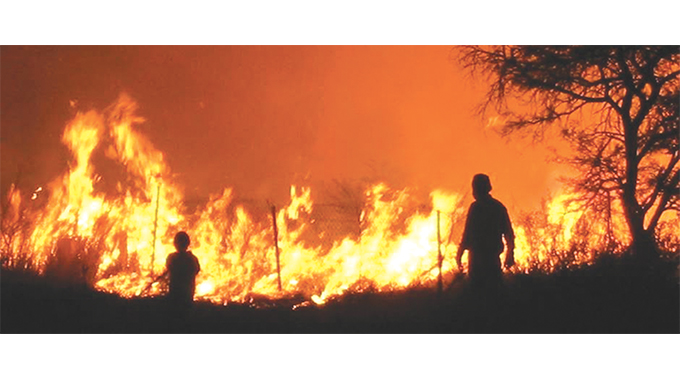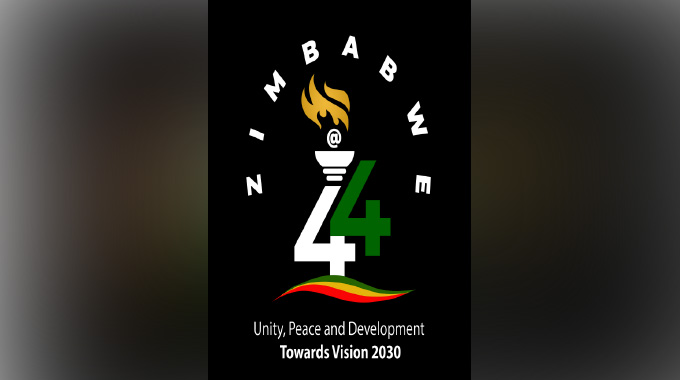Community participation vital to veld fire management

Fortunes Matutu
EVERY year vast tracks of land are burnt due to veld fires and the general trend shows that the extent continues to rise each year.
Veld fires are a problem and if not dealt with could draw back the country in achieving national development strategy goals and attainment of an upper middle-income economy by 2030. They cause serious and significant damage to the environment, livelihoods, economic, social assets and human life in Zimbabwe. It is therefore, very important for communities to take up an active and participatory approach to veld fire management in order to preserve the environment and also protect their livelihoods.
During this current fire season, 70 percent of the veld fire incidences have been recorded in villagised resettlements and communal areas while farms and protected areas account for only 30 percent. A total of 408 366,7 hectares of land have been burnt, an 85 percent increase compared to the same period in 2020 where 220 778,79 hectares were burnt. This year also property worth US$187 167 and timber worth US$5 million has been burnt. Since the year 2000, the general trend shows that veld fires are increasing which is a major cause for concern.
The causes of veld fires are mainly ascribed to human activities associated with land-use systems and practices that are vulnerable to veld fires. Most of the fires are started deliberately but then spread accidentally from their sources into the surrounding veld where they are uncontrollable and subsequently cause extensive damage.
Some fires are started deliberately by livestock owners seeking to promote a green flush for their animals. They rely on veld fires to burn moribund grass and encourage the growth of new and palatable shoots for livestock. Farmers also use fire as a tool to clear vegetation in preparation for the planting season. This is done to suppress weeds and pests and increase the visibility of problem animals. Hunters have also been seen to cause veld fires as they use fire to flush out wild animals and mice to catch them more easily. Furthermore, fires are ignited by people creating fireguards, smoking out beehives to get honey, making charcoal, treating poles, brick moulding and other unattended fires.
The law prohibits starting any fire outside the home during the fire season which stretches from August 1 to October 31. Besides being illegal, the widespread and uncontrolled use of fire during the fire season poses a number of problems for the community and the environment. In most cases, veld fires run wild due to a lack of contingency plans and precautionary fire control measures.
When veld fires are not properly managed, they result in death and injury to people and livestock which cannot escape its smoke, gases and heat. Already during this 2021 fire season fatal losses have been recorded from veld fires caused by mistimed activity, most notably the death of three people in Mashonaland West.
Veld fires lead to severe environmental degradation, disturb the natural balance of the ecosystem and biodiversity.
Fire burns organic matter covering the soil and causes drying out of the topsoil. Many classes of organisms are burnt and the soil becomes barren. The barren soil exposes the land to agents of accelerated land degradation like soil erosion and increases surface runoff. Soil erosion leads to the siltation of rivers and dams thus reducing their water carrying capacity and negatively affecting livelihoods.
Fires destroy fire-sensitive trees and suppress the regrowth of the more resistant species. This prevents the re-establishment of the woodland canopy and alters the patterns of seed production, seed germination and seedling establishment of most flora are lowered. This alters the ecosystem of the area and may cause deforestation, bush encroachment and growth of “useless” invasive alien species.
Veld fire smoke is composed of carbon dioxide, carbon monoxide, nitrous oxides, hydrocarbons, particulate matter and water vapour. These hazardous chemicals have a significant impact on human health and in particular respiratory ailments. These greenhouse gases also cause global warming and ultimately contributes to climate change and is further exuberated by reduced carbon sequestration due to loss of vegetation.
The rural community in resettlement areas and communal areas are the most vulnerable and at high risk, to veld fires, as they rely on forests for their daily livelihoods directly or indirectly. The associated social and economic problems are highly negative and, in most cases, cause permanent damage to the rural community. This further takes a large economic toll on these communities and even causes changes in the long-term structure of the local agricultural economy.
The persistence and rise of veld fires year after year, their causes and impacts on the community suggests that the management of fires needs to be reviewed and calls for a more robust community-based veld fire control strategy.
Communities need to take up more active and responsible roles in ensuring they preserve their forest resources and control veld fires.
To ensure success community members must be a party to decisions on veld fire management. Active and participatory involvement of the local people is the best condition for the successful implementation of fire management programmes in rural areas and even protected areas. A community-based approach can easily capture community dynamics, risk perception and needs taking into account the potential of local resources and capacities.
It is at the community level that physical, social and economic risks can adequately be assessed and managed.
The community-based approach activities should emphasise strengthening capacity to cope with fires and improve livelihood security.
Zimbabwe national fire protection strategy and environment policies clearly recognise and outline the role of community and traditional leaders in fire management and fire prevention. To achieve this the strategy clearly outlines activities to be done as pre-suppression, suppression and post-suppression measures.
Below are some measures that can be implemented by communities to ensure effective veld fire management.
-Chiefs, village heads, community leadership, extension staff and the farmers should form a committee that co-ordinates fire control and planning activities.
– Raise awareness and warn communities of the damage that is associated with uncontrolled fires.
– Strong local campaign to instilling positive traditional practices that enhance the positive management of fires.
– Put in place early fire warning systems.
– Implement fire control methods that include fireguard construction, firefighting and back burning.
– Involvement of stakeholders to assist with resources, technical information, construction of fireguards and reducing biomass and prosecution.
– Carry out veld fire assessments — environmental, social and economic.
– Reporting all fire incidences to Zimbabwe Republic Police, Forestry Commission and Ema.
– Fortunes Matutu is a forester with the Forestry Commission and has a special interest in social forestry.










Comments